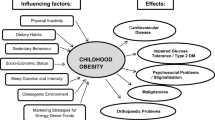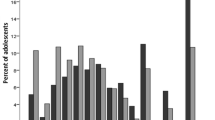Abstract
Aim
Non-communicable diseases (NCDs) are associated with modifiable health risk factors. There is a lack of evidence regarding clusters of health-related behaviours among school-going adolescents from sub-Saharan Africa. This study was conducted to identify clustering patterns of health risk factors (i.e. smoking tobacco, inadequate fruit intake, inadequate vegetable intake, physical inactivity, sedentary behaviour, anxiety and depression) and association with sociodemographic factors among school-going adolescents in Liberia.
Subject and methods
The 2017 Liberian Global School-based Student Health Survey on 2774 adolescents aged 11 years and above (52.5% females) sampled with a two-stage cluster sample design was used. Latent class analysis was used to generate the clusters and latent class regression assessed the associations between sociodemographic factors and the clusters.
Results
We identified three clusters labelled as (1) ‘low substance use, moderately active cluster’ (34.8%); (2) ‘inadequate fruit and vegetable cluster’ (48.9%) and (3) ‘risk taking cluster’ (16.3%)’. Compared to cluster 1, adolescent boys [AOR = 1.71, 1.29–2.27, p < 0.001], and those in grade 10–12 [AOR = 1.51, 1.13–2.02, p < 0.001] were more likely to belong to cluster 2. Participants aged 15 years and above [AOR = 0.60, 0.39–0.91, p = 0.018] were less likely to belong to cluster 2. Compared to cluster 1, adolescents aged 15 years and above [AOR = 3.58, 1.33–9.62, p = 0.011] and those with low socio-economic status [AOR = 1.83, 1.22–2.73, p = 0.003] were more likely to belong to cluster 3.
Conclusion
These results underscore the need for interventions that address adolescent multiple health risk factors, especially considering sociodemographic differences.

Similar content being viewed by others
Data availability
Data for this study was obtained from the World Health Organisation (WHO) website and is freely available online.
References
Albani V, Butler LT, Traill WB, Kennedy OB (2017) Fruit and vegetable intake: change with age across childhood and adolescence. Br J Nutr 117(5):759–765. https://doi.org/10.1017/S0007114517000599
Blakely T, Hales S, Kieft C, Wilson N, Woodward A (2005) The global distribution of risk factors by poverty level. Bull World Health Organ 83:118–126 https://www.scielosp.org/article/bwho/2005.v83n2/118-126/en/
Borba CP, Ng LC, Stevenson A, Vesga-Lopez O, Harris BL, Parnarouskis L et al (2016) A mental health needs assessment of children and adolescents in post-conflict Liberia: results from a quantitative key-informant survey. Int J Cult Ment Health 9:56–70. https://doi.org/10.1080/17542863.2015.1106569
Champion KE, Mather M, Spring B, Kay-Lambkin F, Teesson M, Newton NC (2018) Clustering of multiple risk behaviors among a sample of 18-year-old Australians and associations with mental health outcomes: a latent class analysis. Front Public Health 6:135. https://doi.org/10.3389/fpubh.2018.00135
Collins LM, Lanza ST (2009) Latent class and latent transition analysis: with applications in the social, behavioral, and health sciences. Wiley, Hoboken
Cuenca-García M, Huybrechts I, Ruiz JR, Ortega FB, Ottevaere C, González-Gross M et al (2013) Clustering of multiple lifestyle behaviors and health-related fitness in European adolescents. J Nutr Educ Behav 45:549–557. https://doi.org/10.1016/j.jneb.2013.02.006
Darfour-Oduro SA, Buchner DM, Andrade JE, Grigsby-Toussaint DS (2018) A comparative study of fruit and vegetable consumption and physical activity among adolescents in 49 low-and-middle-income countries. Sci Rep 8:1623. https://doi.org/10.1038/s41598-018-19956-0
Ding D, Rogers K, van der Ploeg H, Stamatakis E, Bauman AE (2015) Traditional and emerging lifestyle risk behaviors and all-cause mortality in middle-aged and older adults: evidence from a large population-based Australian cohort. PLoS Med 12(12):e1001917. https://doi.org/10.1371/journal.pmed.1001917
Doku D, Koivusilta L, Rimpelä A (2012) Socioeconomic differences in alcohol and drug use among Ghanaian adolescents. Addict Behav 37:357–360. https://doi.org/10.1016/j.addbeh.2011.11.020
Frank SM, Webster J, McKenzie B, Geldsetzer P, Manne-Goehler J, Andall-Brereton et al (2019) Consumption of fruits and vegetables among individuals 15 years and older in 28 low-and middle-income countries. J Nutr 149:1252–1259. https://doi.org/10.1093/jn/nxz040
Glozah FN, Oppong Asante K, Kugbey N (2018) Parental involvement could mitigate the effects of physical activity and dietary habits on mental distress in Ghanaian youth. PLoS One 13:e0197551. https://doi.org/10.1371/journal.pone.0197551
Harris BL, Levey EJ, Borba CP, Gray DA, Carney JR, Henderson DC (2012) Substance use behaviors of secondary school students in post-conflict Liberia: a pilot study. Int J Cult Mental Health 5:190–201. https://doi.org/10.1080/17542863.2011.583737
Hayward J, Jacka FN, Skouteris H, Millar L, Strugnell C, Swinburn BA, Allender S (2016) Lifestyle factors and adolescent depressive symptomatology: associations and effect sizes of diet, physical activity and sedentary behaviour. Aust N Z J Psychiatry 50(11):1064–1073. https://doi.org/10.1177/0004867416671596
Hodder RK, Freund M, Wolfenden L, Bowman J, Nepal S, Dray J et al (2017) Systematic review of universal school-based ‘resilience’interventions targeting adolescent tobacco, alcohol or illicit substance use: a meta-analysis. Prev Med 100:248–268. https://doi.org/10.1016/j.ypmed.2017.04.003
Iannotti RJ, Wang J (2013) Patterns of physical activity, sedentary behaviour, and diet in US adolescents. J Adolesc Health 53:280–286. https://doi.org/10.1016/j.jadohealth.2013.03.007
Kugbey N, Ayanore MA, Amu H, Oppong Asante K, Adam A (2018) International note: analysis of risk and protective factors for risky sexual behaviours among school-aged adolescents. J Adolesc 68:66–69. https://doi.org/10.1016/j.adolescence.2018.06.013
Kwan MY, Cairney J, Faulkner GE, Pullenayegum EE (2012) Physical activity and other health-risk behaviors during the transition into early adulthood: a longitudinal cohort study. Am J Prev Med 42:14–20. https://doi.org/10.1016/j.amepre.2011.08.026
Lange BC, Pullen SJ, Petruzzi LJ, Parnarouskis L, Dominguez S, Harris B et al (2018) A qualitative investigation of the perceived role of peers in influencing substance use among youth in Monrovia, Liberia. Vulnerable Child Youth Stud 13:357–367. https://doi.org/10.1080/17450128.2018.1425517
Lanza ST, Collins LM, Lemmon DR, Schafer JL (2007) PROC LCA: a SAS procedure for latent class analysis. Struct Equ Model 14:671–694. https://doi.org/10.1080/10705510701575602
Laska MN, Pasch KE, Lust K, Story M, Ehlinger E (2009) Latent class analysis of lifestyle characteristics and health risk behaviors among college youth. Prev Sci 10:376–386. https://doi.org/10.1007/s11121-009-0140-2
Leech RM, McNaughton SA, Timperio A (2014) The clustering of diet, physical activity and sedentary behavior in children and adolescents: a review. Int J Behav Nutr Phys Act 11:4. https://doi.org/10.1186/1479-5868-11-4
Linzer DA, Lewis J (2011) poLCA: An R package for polytomous variable latent class analysis. J Stat Softw 42:1–29. https://doi.org/10.18637/jss.v042.i10
Lippke S, Nigg CR, Maddock JE (2012) Health-promoting and health-risk behaviors: theory-driven analyses of multiple health behavior change in three international samples. Int J Behav Med 19(1):1–13. https://doi.org/10.1007/s12529-010-9135-4
Loef M, Walach H (2012) The combined effects of healthy lifestyle behaviors on all cause mortality: a systematic review and meta-analysis. Prev Med 55:163–170. https://doi.org/10.1016/j.ypmed.2012.06.017
Matias TS, Silva KS, da Silva JA, de Mello GT, Salmon J (2018) Clustering of diet, physical activity and sedentary behavior among Brazilian adolescents in the national school-based health survey (PeNSE 2015). BMC Public Health 18:1283. https://doi.org/10.1186/s12889-018-6203-1
Meader N, King K, Moe-Byrne T, Wright K, Graham H, Petticrew M et al (2016) A systematic review on the clustering and co-occurrence of multiple risk behaviours. BMC Public Health. 16(1):1-9. https://doi.org/10.1186/s12889-016-3373-6
McAloney K, Graham H, Law C, Platt L (2013) A scoping review of statistical approaches to the analysis of multiple health-related behaviours. Prev Med 56:365–371. https://doi.org/10.1016/j.ypmed.2013.03.002
Nguyen B, Ding D, Mihrshahi S (2017) Fruit and vegetable consumption and psychological distress: cross-sectional and longitudinal analyses based on a large Australian sample. BMJ Open 7(3). https://doi.org/10.1136/bmjopen-2016-014201
Obradors-Rial N, Ariza C, Continente X, Muntaner C (2020) School and town factors associated with risky alcohol consumption among Catalan adolescents. Alcohol 82:71–79. https://doi.org/10.1016/j.alcohol.2019.04.005
Ogundare T, Ghebrehiwet S, Harris BL, Ojediran B, Duncan AM, Syeda HS et al (2020) Risky sexual behaviors and substance use among youths in post-conflict Liberia. J Public Health Epidemiol 12:114–127. https://doi.org/10.5897/JPHE2020.1219
Olurishe TO (2019) Drug and substance abuse in Anglophone West Africa: a mini review. West Afr J Pharm 30:1–12
Oppong Asante K, Kugbey N (2019) Alcohol use by school-going adolescents in Ghana: prevalence and correlates. Mental Health Prev 13:75–81. https://doi.org/10.1016/j.mhp.2019.01.009
Peltzer K, Pengpid S, Tepirou C (2016) Associations of alcohol use with mental health and alcohol exposure among school-going students in Cambodia. Nagoya J Med Sci 78:415–422. https://doi.org/10.18999/nagjms.78.4.415
Petruzzi LJ, Pullen SJ, Lange BC, Parnarouskis L, Dominguez S, Harris B et al (2018) Contributing risk factors for substance use among youth in postconflict Liberia. Qual Health Res 28:1827–1838. https://doi.org/10.1177/1049732318761863
Rasmussen M, Krølner R, Klepp KI, Lytle L, Brug J, Bere E, Due P (2006) Determinants of fruit and vegetable consumption among children and adolescents: a review of the literature. Part I: quantitative studies. Int J Behav Nutr Phys Act 3:22. https://doi.org/10.1186/1479-5868-3-22
Teh CH, Teh MW, Lim KH, Kee CC, Sumarni MG, Heng PP et al (2019) Clustering of lifestyle risk behaviours and its determinants among school-going adolescents in a middle-income country: a cross-sectional study. BMC Public Health 19:1177. https://doi.org/10.1186/s12889-019-7516-4
Watts P, Buck D, Netuveli G, Renton A (2016) Clustering of lifestyle risk behaviours among residents of forty deprived neighbourhoods in London: lessons for targeting public health interventions. J Public Health 38:308–315. https://doi.org/10.1093/pubmed/fdv028
Wengreen HJ, Moncur C (2009) Change in diet, physical activity, and body weight among young-adults during the transition from high school to college. Nutr J 8:32. https://doi.org/10.1186/1475-2891-8-32
Winpenny EM, van Sluijs EM, White M, Klepp KI, Wold B, Lien N (2018) Changes in diet through adolescence and early adulthood: longitudinal trajectories and association with key life transitions. Int J Behav Nutr Phys Act 15:86. https://doi.org/10.1186/s12966-018-0719-8
World Health Organization (2010) Global recommendations on physical activity for health: World Health Organization. https://www.who.int/dietphysicalactivity/global-PA-recs-2010. Accessed 20 June 2020
World Health Organization (2014a) Global status report on noncommunicable diseases 2014: World Health Organization. https://www.who.int/nmh/publications/ncd-status-report-2014/en. Accessed 20 June 2020
World Health Organization (2014b) Global School-based Student Health Survey (GSHS) purpose and methodology. http://www.who.int/chp/gshs/methodology/en/. Accessed 20 June 2020
World Health Organization (2014c) Global status report on alcohol and health. World Health Organization. https://www.who.int/substance_abuse/publications/alcohol_2014/en/. Accessed 20 June 2020
World Health Organization (2018) Noncommunicable diseases country profiles 2018. https://www.who.int/nmh/publications/ncd-profiles-2018/en/. Accessed 20 June 2020
Acknowledgements
The authors wish to express their gratitude to the World Health Organisation (WHO) and its partners for the data collected and for making the data freely available. We also thank the students for their participation in the study.
Funding
The authors have no relevant financial or non-financial interests to disclose.
Author information
Authors and Affiliations
Contributions
Prince Atorkey conceptualised the study and the design. Statistical analysis was performed by Prince Atorkey. The first draft of the introduction, methodology and results were written by Prince Atorkey with input from Kwaku Oppong Asante. Discussion was written by Kwaku Oppong Asante. All authors critically reviewed the manuscript and approved the final version.
Corresponding author
Ethics declarations
Conflicts of interest
The authors declare that they have no conflict of interest.
Ethical approval
All procedures performed in studies involving human participants were done in accordance with the ethical standards of the Ethics Committee of the Liberia Ministry of Education and the WHO and with the 1964 Helsinki Declaration and its later amendments or comparable ethical standards. Written approval was obtained from Liberia Ministry of Education, the schools that participated, and teachers.
Informed consent
Written informed consent was obtained from students and additional parental consent from parents of participants who were below 18 years.
Additional information
Publisher’s note
Springer Nature remains neutral with regard to jurisdictional claims in published maps and institutional affiliations.
Rights and permissions
About this article
Cite this article
Atorkey, P., Asante, K.O. Clustering of multiple health risk factors among a sample of adolescents in Liberia: a latent class analysis. J Public Health (Berl.) 30, 1389–1397 (2022). https://doi.org/10.1007/s10389-020-01465-y
Received:
Accepted:
Published:
Issue Date:
DOI: https://doi.org/10.1007/s10389-020-01465-y




